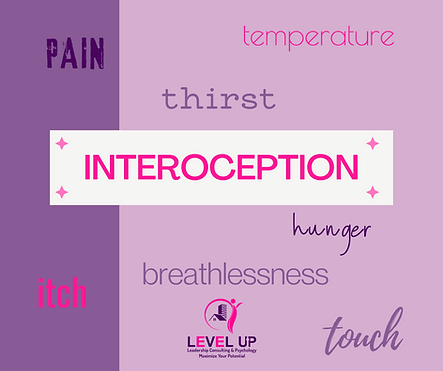Interoception is the sense responsible for helping you notice the inside of your body and it gives you important clues about how you are feeling: such as hungry, thirsty, sad, or anxious. Research on interoception is one of the fastest growing areas of neuroscience. Researchers have identified that interoceptive differences are common and have been found in people with many of the following conditions:
Autism
ADHD
Eating disorders
Sensory processing disorder
PTSD
Anxiety
Panic disorders
Dementia
Depression
Obesity
Tourette’s Syndrome
Addiction
Chronic pain syndrome
Interoception is closely tied to our regulation – interoceptive signals drive self regulation behaviours. Good interoceptive awareness allows us to clearly feel emotions in the body. For example sadness feels different from anxiousness. A little angry feels different from really really angry. The ability to feel these differences is crucial to emotional awareness and can lead to healthier, effective coping skills.Many programs that teach self-regulation skills assume that an individual is aware of how they are feeling and can choose an appropriate coping strategy to help them feel differently. But many individuals struggle to recognize body signals as clues to how they are feeling or get confused by their body signals. In order to be effective at self-regulation we need to first be clear about HOW we are feeling to know WHAT to do in order to feel better.

What are some signs a person may be struggling with Interoceptive Awareness
Always seem to be hungry or don’t feel full after eating.
Frequently complain of feeling unwell, but can’t provide specific symptoms.
Need to use the bathroom frequently or do not sense the need to go until it is an emergency.
Unusually high or low pain threshold.
Do not recognize they are getting overwhelmed until they are REALLY overwhelmed.
Have a hard time figuring out what to do to make their body calm.
May report feeling many different internal sensations but unable to determine what they mean.
Difficulty recognizing early signs of emotions.
The good news is the research clearly shows that interoceptive awareness (IA) can be improved with strategies and practice that help individuals develop a stronger body-emotion-action connection that leads to improved ability to use self-regulation skills.
Our Occupational Therapists can use a combination of tools (such as interview, observation, and/or self-report or caregiver report measures) to understand how IA may be impacting your functioning.
Depending on the functioning of the individual and their goals, our OTs can work with you to address reduced IA through individualized interventions. This may include the development of adaptations for reduced IA, or activities and interventions designed to build IA over time.
If you have questions regarding occupational therapy services, please contact our client relations team.